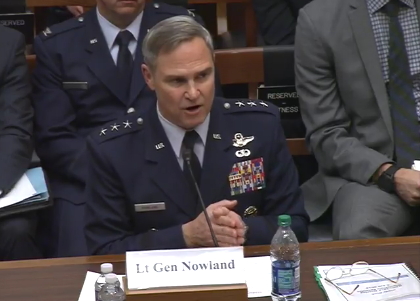
Lt. Gen. Mark Nowland, deputy Air Force chief of staff for operations, told members of a House Armed Services subcommittee on Tuesday that maintenance likely is the cause of repeated hypoxia-like issues in the T-6 trainer fleet. Screenshot/HASC.
The Air Force’s deputy chief of staff for operations told House legislators on Tuesday that maintenance likely is to blame for multiple hypoxia-like issues that forced the service to ground its T-6 trainer fleet earlier this month.
During his testimony before the House Armed Services Tactical Air and Land Forces Subcommittee, Lt. Gen. Mark Nowland also emphasized the importance of training, causing the subcommittee chairman to lit into the service for not taking the threat seriously enough.
The 19th Air Force suspended all T-6 operations this month after a “cluster” of unexplained physiological events was reported at three Air Force bases within a week. In November 2017, Davis-Monthan AFB, Ariz., also grounded a third of its A-10 Warthog fleet for about a week because of hypoxia-related issues.
Nowland said the T-6’s onboard oxygenating systems appear to working properly, but “maintaining it is the critical factor.” He said the time-change technical order for the onboard oxygen-generating system does not exist, so the service has “never trained our technicians on how to maintain that piece of equipment.” However, after flying the trainers for “2.1 million hours,” the service suspects that maintenance is needed on that system, “but we don’t know that for sure,” he said.
Nowland noted that the service has increased funding for the 711th Human Performance Wing, which has supported research into hypoxia, biomechanics, and toxicology studies. The service also has convened a team, led by Brig. Gen. Bobbi Jo Doorenbos, to investigate unexplained physiological events. That team’s research will focus on identifying “solutions for high-performance aircraft that optimize human performance in tactical aviation, and eliminate or minimize the impact of unexplained physiologic incidents,” said Nowland.
Maj. Gen. Patrick Doherty, commander of the 19th Air Force, and his wing leaders are “actively meeting in person with T-6 instructors and student pilots to discuss the current situation and to listen to their concerns,” he told the panel, adding that “direct interface with the leadership to the pilots is critical,” as is meeting with spouses and assuring family members that the Air Force puts safety first.
The key is trust, said Nowland, and “that’s why training is critical … as we move forward.”
Rep. Mike Turner (R-Ohio), though, lashed into Nowland, saying he “could not be more disappointed by your presentation,” specifically the service’s focus on training as a solution.
“This is a significant issue. It’s not just listen and talk. This is pure safety,” said Turner. “No one ever came to us and tried to blame the pilots and say it’s just an issue of training. There is something wrong with the systems that these pilots are relying on for their lives and that we’re asking them to rely on.”
Turner said he was “stunned” to have the issue described as a training problem.
Nowland tried to reassure Turner that the Air Force is not blaming the pilots, while also defending what he called the Air Force’s “holistic” training and examination of maintenance issues. However, in an emailed statement from Turner’s office Wednesday, he dismissed Nowland’s testimony.
“Gen. Nowland was unconvincing in providing the committee with any assurances that this issue is being adequately addressed,” Turner said. “His testimony did not respond to the 399-page NASA report that the committee had requested on science and research on hypoxia.”